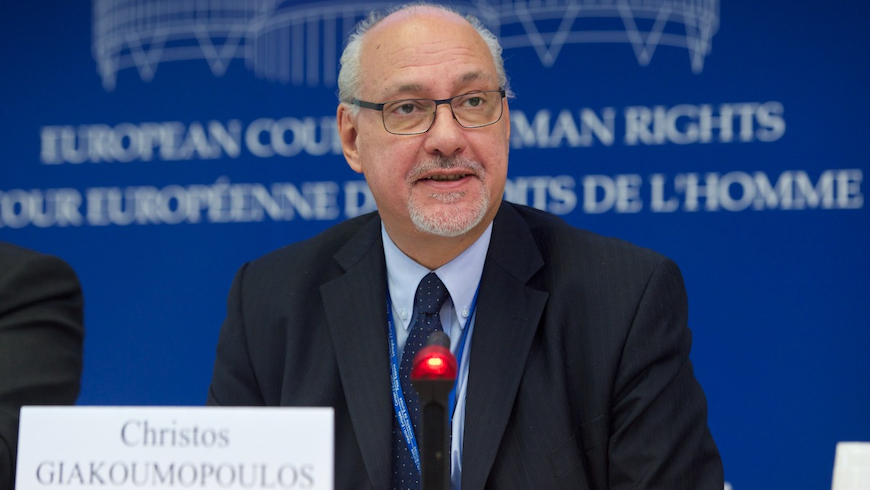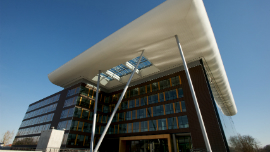Opening speech by Christos Giakoumopoulos
Launch of the event of the project “HELP in Russia” (Phase II)
20 November 2018, Russian State University of Justice, Moscow
Interpretation (EN/ RU)
Dear Rector,
Distinguished judges,
Excelencies,
Ladies and Gentlemen,
I am honoured by this opportunity to welcome you today on behalf of the Council of Europe at this launching event of the second phase of the European Programme on Human Rights Education of Legal Professionals in the Russian Federation, better known under its abbreviation as "HELP Programme".
Our meeting this morning is an excellent opportunity to take stock of the Council of Europe's fruitful cooperation with the Russian judicial system and the legal community at large. Indeed, our organisation has developed a genuine partnership - perhaps even a unique one - with all actors of the legal system. This partnership is an outstanding asset arising from Russia's membership in our Pan-European organisation.
I would like at the outset to thank Rector Valentin Erchov and the Russian State University of Justice for being our reliable partner throughout more than two decades. The Council of Europe greatly values the continuous support by the Supreme Court and its President, Mr Vyacheslav Mikhaylovich Lebedev. The Council of Europe highly values this privileged relationship with the Supreme Court of the Russian Federation.
I am also pleased to extend our greetings to other leading figures of the Russian legal system, namely to the President of the Russian Federal Chamber of Advocates, Mr Yury Pilipenko, Vice-minister of Justice, Mr Mikhail Galperin, and high representatives of the General Prosecutor's Office.
The Council of Europe also appreciates the standing support to our cooperation by the Ministry of Foreign Affairs, which is also represented today at a high level. We also acknowledge with great interest the involvement in this cooperation of numerous other authorities and institutions, including the Ministry of Health, the Ministry of Education, the Presidential Council for Human Rights, the Federal Ombudsman's office, whose representatives are also most welcome to our event.
It is a particular pleasure to see among us representatives of the Council of Europe member States and I thank them all for being so supportive of our Pan-European HELP Programme and its continuation in the Russian Federation.
I find it symbolic that our event takes place at the end of the year during which we marked the 20th anniversary of Russia’s accession to the European Convention on Human Rights, a cornerstone of the legal architecture in greater Europe. These twenty years have been marked by numerous achievements in terms of judicial protection of human rights in Europe, including in the Russian Federation. All those achievements have been made possible through intensive day-to-day dialogue and interaction between the Council of Europe and the judicial systems of our member States. The Russian judicial system has never been an exception. The great number of Russian judges from all regions sitting today in this room speaks for itself.
One of the privileged channels for our communication with national judiciaries is dedicated to high-quality legal training under the HELP programme.
Let me emphasise both its importance and significance. HELP Programme is to date the only genuine Pan-European Programme of legal education and training and the only Network of judicial training institutions and bar associations of the 47 member States of the Council of Europe. It has by now become a comprehensive platform for all training activities of the Council of Europe.
HELP is getting stronger every year as it widens in scope. While initially focusing on the European Convention on Human Rights, HELP has now gone far beyond, as you can see from our agenda. For example, we will present to you later this morning the courses on bioethics elaborated together with the Russian Ministry of Health and the course on rights and obligations in sport, - our joint venture with the Ministry of Sport and MGIMO University.
The next phase of our HELP Programme will allow to diversify our activities even further. While strengthening our cooperation on the existing tracks, we will be able to extend our training activities to such areas as the fight against domestic violence and against trafficking of human beings. These new topics cover cross-cutting issues in which the Council of Europe has extensive expertise. Russian judges, prosecutors and lawyers will benefit from novel, interactive and user-friendly courses which are based on the symbioses of domestic legal sources and the relevant international conventions together with the evolving case-law and best national practices. All HELP courses always contain self-learning materials and follow country-specific curricula which are adapted to national legal system by leading national experts in each area. This is what brings the HELP courses so much closer to domestic judges and lawyers.
We will tell you today about both our new forthcoming activities and about what has already been achieved. All courses we have developed so far with our Russian partners were driven primarily by domestic demand coming from Russian legal professionals themselves. For example, the course on “Admissibility of evidence in criminal proceedings” was particularly appreciated by Russian judges, while lawyers were quite naturally attracted by the course on "Admissibility criteria for applications to the European Court of Human Rights".
The Council of Europe is quite proud of the high quality work that has been done with our Russian partners since the launching of the HELP Project in this very building three years ago. The materials we have developed in are on high demand far beyond Russia and some of them are being adapted to other countries. Hence, our work in the Russian Federation is also a significant contribution to the general development of the HELP Programme Europe-wide and we readily involve our best Russian experts in different European fora. I take this opportunity to commend our experts, not least those who will speak this morning, for their commitment and for their contribution to our Pan-European cooperation under the Council of Europe's umbrella.
Once again, I would like to reaffirm our position to all our national and international partners. All activities of the Council of Europe, be it in Russia or any other country, must pursue the same overarching goal, that is a closer union between our member States, as provided for in Article 1 of the Statute of the Organisation. This is the only spirit that underpins our cooperation activities. And we will pursue this line as best as we can. I am convinced we all share this common vision in this room, notwithstanding the tough challenges Europe is currently facing.
Ladies and gentlemen, dear colleagues,
I encourage you to exploit to the fullest the potential of the HELP Programme's resources in legal training for the sake of a more effective protection of constitutional and conventional rights at the national level. HELP aims at equipping you with suitable tools for effective adjudication at home and thus at reducing the number of cases flowing to the Strasbourg Court.
The primary objective of the HELP programme is, therefore, no more than what you read in its title: to HELP legal professionals all over Europe in facing the key challenge of coping with quickly expanding and evolving domestic and international case law. Indeed, HELP is designed to better inform you and to save your time, and certainly not to add to your already heavy burden.
In view of the immense resources generated by the HELP programme in the context of in-service professional training, we are now reflecting on how to open our courses to European universities.
Russian universities are increasingly attracted by the HELP programme. I am glad that some of them are also represented in this room. We will need more investment from our member States to support further projects bringing HELP courses closer to academia.
Academic cooperation on the Council of Europe conventions may be our next step to consider. However, I will not anticipate on that one at the present stage. Let me conclude by thanking once again all our national and international partners for their commitment. I am looking forward to our exchange today and, indeed, to continuation of our very fruitful project with the Russian State University of Justice and its regional branches all over the immense Russian territory.
Thank you!
-o0o-




